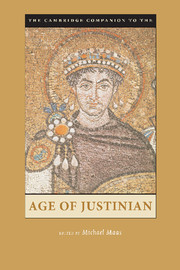Book contents
- Frontmatter
- Part 1 Structures and Ideologies of Empire
- 1 Roman Questions, Byzantine Answers
- 2 Economy and Administration
- 3 Justinian’s Constantinople
- 4 The Classical City in the Sixth Century
- 5 The Empire at War
- 6 Mediterranean Plague in the Age of Justinian
- 7 Law and Legal Practice in the Age of Justinian
- 8 Justinianic Ideology and the Power of the Past
- Part 2 Religion and Philosophy
- Part 3 Literature and the Arts
- Part 4 Peoples and Communities
- Bibliography
- Index
- Plate Section 1
- Plate Section 2
5 - The Empire at War
from Part 1 - Structures and Ideologies of Empire
Published online by Cambridge University Press: 28 May 2006
- Frontmatter
- Part 1 Structures and Ideologies of Empire
- 1 Roman Questions, Byzantine Answers
- 2 Economy and Administration
- 3 Justinian’s Constantinople
- 4 The Classical City in the Sixth Century
- 5 The Empire at War
- 6 Mediterranean Plague in the Age of Justinian
- 7 Law and Legal Practice in the Age of Justinian
- 8 Justinianic Ideology and the Power of the Past
- Part 2 Religion and Philosophy
- Part 3 Literature and the Arts
- Part 4 Peoples and Communities
- Bibliography
- Index
- Plate Section 1
- Plate Section 2
Summary
Imperial majesty should not only be graced with arms but also armed with laws, so that good government may prevail in time of war and peace alike. The head of the Roman state can then stand victorious not only over enemies in war but also over troublemakers, driving out their wickedness through the paths of the law, and can triumph as much by his devotion to the law as for his conquests in battle. Long hours of work and careful planning have, with God’s help, given us success in both these fields. Barbarian nations brought beneath our yoke know the scale of our exertions in war. Africa and countless other provinces, restored to Roman jurisdiction and brought back within our empire after so long an interval, bear witness to the victories granted to us by the will of heaven. However, it is by the laws that we have already managed to enact and collect that all our peoples are ruled.
– Justinian, Institutes, pr., Nov. 21, 533, trans. P. Birks and G. McLeodWar was undoubtedly an important feature of the Age of Justinian, most famously in the campaigns of reconquest that recovered North Africa from the Vandals and Italy from the Goths, but also in relations with Persia to the east, and with various tribal peoples along the lower Danube. As this extract from the preface to Justinian’s handbook for law students makes clear, Justinian took an elevated view of the waging of war, presenting it, alongside law making, as one of his central, God-given duties.
- Type
- Chapter
- Information
- The Cambridge Companion to the Age of Justinian , pp. 113 - 133Publisher: Cambridge University PressPrint publication year: 2005
- 11
- Cited by

